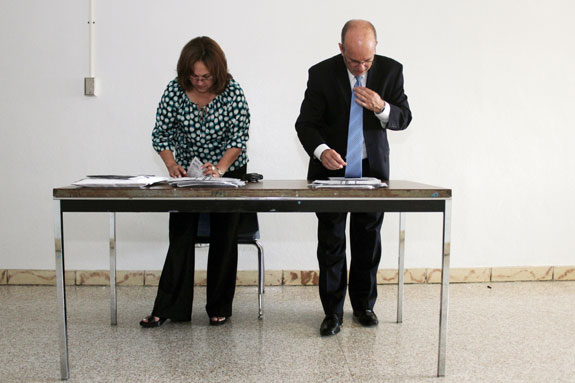
Millie Fornell, left, and John Doyle, both Miami Dade County Public Schools officials, count student voter registration applications at Southwest Miami High School on May 30, 2012, as part of a district-wide registration drive. (Photo by Ethan Magoc/News21.)
By Ethan Magoc
News21
African-American civic groups, politicians and church leaders are concerned that changes in Florida’s early voting schedule will lower minority turnout, which could mean fewer votes for Democrats in November.
Florida’s early, in-person voting period almost certainly will shrink this fall. Since 2004, when the state began early voting, county election officials had to provide a minimum of 14 voting days, or 96 hours, of early voting opportunities, including limited weekend hours. Under a law passed in 2011, counties can still offer 96 hours of early voting, but those hours cannot be spread over more than the state-required eight days.
About This Project
“Who Can Vote?” was produced by News21, a national investigative reporting project involving college journalism students across the country and headquartered at the Walter Cronkite School of Journalism and Mass Communication at Arizona State University. News21 is funded by the Carnegie Corporation of New York and the John S. and James L. Knight Foundation. Review the complete Voting Rights in America project. RelatedRead other stories in the “Who Can Vote?” series. |
The 2011 law also eliminated voting on the Sunday before the election, which was offered by 10 of the state’s 67 counties in 2008. African-American churches traditionally reserved that day for “Souls to the Polls” campaigns, in which voters went from churches to early-voting sites.
“We do believe it’s a deliberate attempt to disenfranchise the voters,” said state Rep. Barbara Watson, a Democrat from Miami Gardens, concerned about the law’s effect on turnout in large counties such as Miami-Dade.
Rep. Dennis Baxley, a Republican from Ocala who sponsored the legislative change, said that eliminating Sunday hours was about timing.
“It seems like we had too tight a squeeze (before Election Day on Tuesday),” he said. “You had to count the early votes and be all set up in the counties for a general election in two days. What’s the big deal? It’s just a scheduling issue.”
President Barack Obama won 96 percent of Florida’s black vote in 2008. African Americans that year cast 22 percent of the state’s early in-person votes, although they were only 13 percent of registered voters, according to an analysis by Daniel Smith, a University of Florida political science professor, and Michael Herron of Dartmouth.
Democratic turnout for early and absentee voting in Florida increased 5 percent from 2004 to 2008, while Republican early votes dropped 6 percent, according to data compiled by Michael McDonald, a political scientist at George Mason University.
“What we have to do is act like that old Florida chameleon that changes colors,” said Elder Lee Harris, 68, pastor of Mount Olive Primitive Baptist Church in Jacksonville. “We have to adapt to whatever our environment is.”
Harris said his church and its 300-member congregation joined another 60 churches to encourage Sunday voting the weekend before the 2008 presidential election. He said the group will organize on one of the other weekend days this year.
State Sen. Chris Smith, a Democrat who represents Broward and Palm Beach counties, is encouraging churches in his district to hold services on Saturdays during early voting.
Voters like Anita Smith, 38, of Gainesville, enjoy the convenience of voting early.
“I didn’t want to be in the long lines,” said Smith, who voted early in the 2008 primary and general elections. “I went early and got it out of the way.”
In Palm Beach County, Supervisor of Elections Susan Bucher wants to keep turnout near 2008 early-voting levels. She plans to open two additional early voting sites, which she said will cost $52,000 for voting machines and salaries.
Rodney Long, a retired Democratic politician in northern Florida’s Alachua County, said his group, the African American Accountability Alliance, will organize church and political leaders for early voting.
“If you tell me that there’s a problem with that Sunday, there should be some evidence. There’s 67 people in Florida who could provide it. (Lawmakers) did not receive any testimony from the 67 county officials about Sunday processing. Everyone’s voting electronically – no more chads, no delays,” Long said.
Andrea Rumbaugh of News21 contributed to this story.
This report is part of a project on voting rights in America produced by the Carnegie-Knight News21 program.

